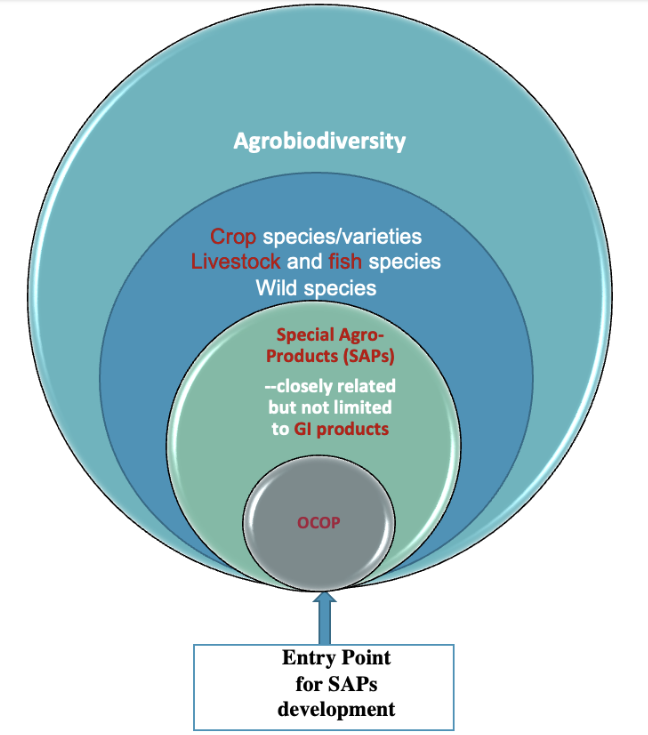Agricultural production systems encompassing crop, forestry, livestock, aquaculture, and fisheries production play an essential role in meeting the increasing demands for food, feed, fiber, and fuel. Achieving an environmentally sustainable increase of production and access to affordable healthy diets, while protecting and enhancing the livelihoods of the world’s small-scale agricultural producers and other agrifood system actors, is a global challenge. Moreover, agricultural production systems still lack integration, optimization, diversification, and innovation, while relying on the intensive use of chemical inputs and natural resources. Additionally, global food supplies today rely increasingly on just a few crops and animal species, increasing the vulnerability to biotic stresses.
What is the OCOP initiative?
FAO launched the Global Action on Green Development of Special Agricultural Products: “One Country One Priority Product” (OCOP) in September 2021 based on the FAO Strategic Framework 2022–31. The Global ActionThe OCOP will promote inclusive, profitable, and environmentally sustainable food systems through green development of Special Agricultural Products (SAPs) that include optimizing the structure, functionality, and service of SAPs production systems; minimizing losses of crop yields and biodiversity, food loss and waste, misuse of agricultural chemicals, and maximizing integrated agricultural profits to enable the transition to MORE efficient, inclusive, resilient and sustainable agrifood systems.
What are Special Agricultural Products (SAPs)?
Special Agricultural Products (SAPs) are the agricultural products with unique qualities and special characteristics associated with geographical locations and cultural heritages. They are an important example of underutilized resources that can significantly contribute to ensuring food security and healthy diets, supporting farmers’ livelihoods and economic growth while protecting the environment and biodiversity. SAPs include all kinds of agricultural products, recognized (or having the potential to be recognized) as symbolic national or local agricultural products, but have not benefited from local agricultural and rural development programmes to the extent of commonly grown staple crops (e.g. rice, wheat, maize, soybean and potato). SAPs have huge potential to be integrated into local, regional, and global markets and trade. Development of SAPs can help address the challenges mentioned above, including natural resource constraints, environmental pollution, ecological degradation, and climate change.

Graph 1: Relationship between OCOP and SAPs.
Approach and principles
The OCOP initiatives take the food systems approach, covering the four major components of food systems of (1) production; (2) processing; (3) marketing; (4) consumption. Through knowledge sharing on innovative solutions and approaches such as the Geographical Indications systems (GI), One Village One Product movements (OVOP), Globally Important Agricultural Heritage Systems (GIAHS), the OVOP initiatives identify and promotes the development of Special Agricultural Products (SAPs) in the most adapted agro-ecological regions including tropics, drylands, and mountainous regions. OCOP is a country-owned and country-led initiative which is inclusive to all FAO Members.
The implementation of the OCOP is based on the principles of:
- a collaborative design and country-led implementation;
- a demand-driven and comparative advantage-oriented approach;
- integrating production within a value chain approach;
- an approach centered on agroecological regions and production systems to promote green technologies; and
- a multidisciplinary approach and engagement with different stakeholders. The OCOP features four areas of inclusiveness, such as country inclusive, product inclusive, value chain inclusive and stakeholder inclusive.
Coordination and implementation
The Steering Committee (SC), set up at FAO headquarters, oversees the implementation at global level. The SC is chaired by FAO Director-General and composed of the relevant senior co-leaders and directors of divisions/centres/offices, as well as relevant observers. The Regional Organizing Group (ROG), established for each region, coordinates the implementation within the region. The ROG is led by the FAO Regional Assistant Director-General and composed of relevant members from the Regional Office, and FAO Representatives of participating countries in the region.The National Task Force (NTF), set up in each participating country, carries out the implementation of the activities at the national level. It is led by the Senior Officer of the responsible Ministry and composed of the relevant members from different departments and the Senior Officer from FAO Country Office.

Graph 2: Regional Coordination Mechanism on OCOP to support Member States
for implementing OCOP in Asia and the Pacific
